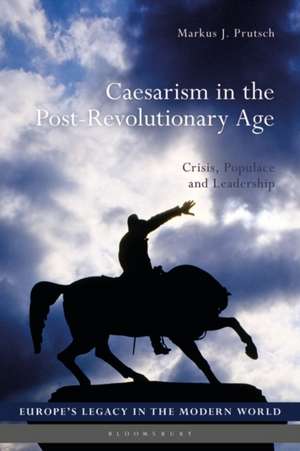Caesarism in the Post-Revolutionary Age: Crisis, Populace and Leadership: Europe’s Legacy in the Modern World
Autor Markus J. Prutschen Limba Engleză Paperback – 21 apr 2021
| Toate formatele și edițiile | Preț | Express |
|---|---|---|
| Paperback (1) | 219.19 lei 43-57 zile | |
| Bloomsbury Publishing – 21 apr 2021 | 219.19 lei 43-57 zile | |
| Hardback (1) | 657.29 lei 43-57 zile | |
| Bloomsbury Publishing – 30 oct 2019 | 657.29 lei 43-57 zile |
Preț: 219.19 lei
Nou
Puncte Express: 329
Preț estimativ în valută:
41.96€ • 45.59$ • 35.27£
41.96€ • 45.59$ • 35.27£
Carte tipărită la comandă
Livrare economică 21 aprilie-05 mai
Preluare comenzi: 021 569.72.76
Specificații
ISBN-13: 9781350245198
ISBN-10: 1350245194
Pagini: 240
Dimensiuni: 156 x 234 mm
Greutate: 0.42 kg
Editura: Bloomsbury Publishing
Colecția Bloomsbury Academic
Seria Europe’s Legacy in the Modern World
Locul publicării:London, United Kingdom
ISBN-10: 1350245194
Pagini: 240
Dimensiuni: 156 x 234 mm
Greutate: 0.42 kg
Editura: Bloomsbury Publishing
Colecția Bloomsbury Academic
Seria Europe’s Legacy in the Modern World
Locul publicării:London, United Kingdom
Caracteristici
Adopts an interdisciplinary approach, bringing together insights from political history, political theory and the history of ideas
Notă biografică
Markus J. Prutsch is Senior Investigator and Administrator at the European Parliament, and Associate Professor of Modern and Contemporary History at Heidelberg University, Germany. He has a PhD from the European University Institute in Florence and is a Fellow of the Heidelberg Academy of Sciences and Humanities.
Cuprins
Preface1. Introduction2. Revolution and Crisis3. 'Bonapartism' as Hazard and Promise4. From Bonapartism to Caesarism: The Mid-Century and Louis-Napoleon5. 'Germanic Caesarism' and the Bismarkckreich6. Mass Democracy and 'Scientification': Caesarism at the turn of the Century7. Outlook: Legacies of Caesarism8. ResultsBibliographyIndex
Recenzii
By exploring Caesarism as a plebiscitarian form of autocratic leadership from the French Revolution to the present, Markus Prutsch helps us place the current crisis of liberal democracy into historical perspective. The author cogently demonstrates that the rise and fall of popular dictators must be understood as an integral part of the history of modern democracy.
Incisive, lucid and original, this study of Caesarism is a major contribution to an understanding of 19th-century European political history.
In Caesarism in the Post-Revolutionary Age, Markus Prutsch takes us on a fascinating journey from the French Revolution to the 20th century. This book is a detailed and subtle explication of a desire for heroes and saviours "doing what is deemed necessary to dispose of political systems that are perceived as unjust or rotten."
A remarkable historian is needed to broach the sprawling, amorphous and seminal concept of 'Caesarism' in the history of modern Europe. Markus Prutsch is exactly that. Few modern scholars have the intellectual dexterity, linguistic skills or the historical hinterland to construct a coherent study of the place of authoritarianism in so dynamic a period of history, but Prutsch has all these qualities and has done exactly this. A work of formidable scholarship and powerful intellect.
Incisive, lucid and original, this study of Caesarism is a major contribution to an understanding of 19th-century European political history.
In Caesarism in the Post-Revolutionary Age, Markus Prutsch takes us on a fascinating journey from the French Revolution to the 20th century. This book is a detailed and subtle explication of a desire for heroes and saviours "doing what is deemed necessary to dispose of political systems that are perceived as unjust or rotten."
A remarkable historian is needed to broach the sprawling, amorphous and seminal concept of 'Caesarism' in the history of modern Europe. Markus Prutsch is exactly that. Few modern scholars have the intellectual dexterity, linguistic skills or the historical hinterland to construct a coherent study of the place of authoritarianism in so dynamic a period of history, but Prutsch has all these qualities and has done exactly this. A work of formidable scholarship and powerful intellect.









